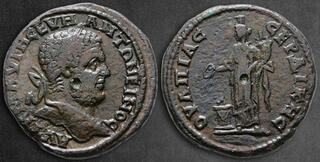| Savoca Numismatik GmbH & Co. KG > Online Auction 187 | Silver | Auction date: 10 December 2023 |
| Lot number: 116 Price realized: 50 EUR (Approx. 54 USD) Note: Prices do not include buyer's fees. | Show similar lots on CoinArchives Find similar lots in upcoming auctions on |
| Lot description: Thrace. Serdica. Caracalla AD 198-217. Bronze Æ 31 mm, 16,87 g ΑΥΤ ΚΜ ΑΥΡΗ CΕΥΗ ΑΝΤΩΝΕΙΝΟC, laureate head right / ΟΥΛΠΙΑC CΕΡΔΙΚΗC, Homonoia standing facing, head left, holding patera over lighted altar and cornucopia. Very Fine Varbanov 2394. "Homonoia," an ancient Greek term resonating with the profound ideals of "concord" and "unity," encapsulated a central concept in both ethical and political spheres of ancient Greek society. This principle of harmonious living, agreement, and concord was considered not only a political necessity but also a moral virtue. In the political realm, homonoia embodied the vision of an ideal state where citizens within a city-state (polis) would exist in a state of unity and agreement. This cohesion was deemed paramount for the stability and prosperity of the community, with leaders and lawmakers actively cultivating homonoia to prevent internal strife and discord. Beyond its political significance, homonoia held ethical weight, representing a virtue that called for individuals to prioritize the common good over personal interests. It fostered a sense of civic responsibility, urging citizens to collaborate for the greater benefit of the community. The concept of homonoia extended into religious practices in some Greek city-states, where cults dedicated to deities associated with unity and concord were established. Rituals and ceremonies were conducted to reinforce the ideals of harmony. Certain goddesses were associated with the epithet of Homonoia, further emphasizing the divine connection to the principle. For instance, Demeter, the goddess of agriculture, and Themis, the goddess of divine law and order, were linked to the concept of unity and concord. Throughout the works of influential Greek philosophers like Plato and Aristotle, the importance of homonoia in the functioning of an ideal state was explored and discussed. The concept persisted into the Hellenistic period, where rulers sought to establish homonoia among the diverse regions under their rule. Homonoia, therefore, stands as a testament to the Greeks' emphasis on communal well-being, cooperation, and the pursuit of shared objectives for the greater good. It served as a foundational principle shaping the ethical and political landscape of ancient Greek city-states. Starting price: 50 EUR |  |


